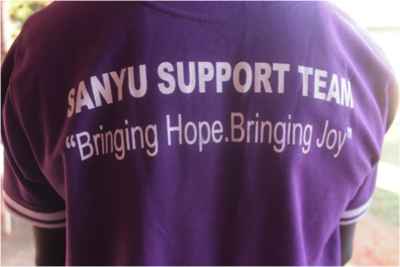
Hope in Bethlehem
![]() Dr Mhoira Leng
Dr Mhoira Leng
![]() 10th December 2018
10th December 2018
Visiting Bethlehem and the West Bank is such a privilage and yet holds many contradictions. Wandering the ancient streets and enjoying coffee with a local man who tells me stories of the old days and his faith for the future; staying at the beautiful Dar Sitti Azziza with Nabiil and Emily and hearing stories of centuries of this orthodox family; time with the faculty and Dean, Dr Mariam Awad, in the beautiful Franciscan Bethlehem University and see the students and staff thriving despite many many challenges not least those presented by 'the wall'. Exploring the back streets of Hebron to find amazing coffee and remember Abraham's decision but also see the tension and poverty of this ancient city. Climbing Herodian Hill and thinking of the hills and valleys Mary and Jospehy navigated....when about to deleiver her first baby!!! I have an unusual nativity scene bought next to 'the wall' in Bethlehem which shows the Wise Men challenged as they try 'come and worship'.
In the midst of this let me intoduce 2 shining stars for me who are working to mprove the lives of their patients and families and the wider population. Let me tell you about Dr Amal Awad, Director General of Education in Health and Dr Rania Shahin, Director of Pharmacy at the Palestinian Ministry of Health. They have worked together to ensure availability of oral morphne in sustained released and immediate release tablet formulations as well as oral oxycodone syrup for children. They are then rolling out education and training accross West Bank usuing a guideline adapted from our work in Uganda. It has been my privilege to work with these and other colleagues and amazed at their efficiecny and efffectiveness as they listened to the evidence, changed formularies and started to institute change. I am looking forward to visiting next year and offering further support but also to know there will be many many people receieving pain relief this year because of this work.
Let me share Dr Awad's words 'Two Pain management Protocol workshops were conducted by the General Directorate of Education in Health in coordination with the General Directorate of Hospitals and the General Directorate of Pharmacy. The main purpose of the workshops was to respond to one of the main CPD Needs highlighted by physicians, midwives, nurses, and pharmacists in response to patients’ concerns of under prescription or over prescription. The workshop targeted systematic pain management according to global standards using a unified pain management protocol within hospitals to clarify misconceptions regarding pain management.
In consultation with Dr. Mhoira Leng the standard training workshops agenda for pain assessment and management was developed and conducted twice to facilitate access for health care providers. The first workshop was conducted in Ramallah for the North area of the West Bank on November 22nd , and the second workshop was done on December 9th in Bethlehem for the south area of the West Bank. The following was our agenda for the workshop:
Welcoming and introduction
Pain Protocol using a person-centred approach within a multidisciplinary team/ Presented by: Dr Amal Abu Awad
Physiology, Pathology, and Assessment of Pain/ Presented by: Dr. Nizar Taraweh
Taking pain management forward; non-pharmacological approaches/ presented by: Mr Bashar Qashu
Pharmacologic Treatment of Pain /presented by: Dr Safa Blaibleh
WHO ladder in the management of Pain: use of opioids including oral morphine./ presented by: Dr Layla Al-Khayyat
Discussion and Steps Forward/ by all presenters
Many thanks goes to our supporting partners UNFPA, MAP-UK, all our presenters, and to Dr. Mhoira.
Let us always remember that together as a team we can make a difference in decreasing the suffering of our patients.'
As we see this huge step forward in West Bank we also hope and to see pain relief available for so many in need in Gaza.
It is humbling to reflect on the amazing peoeple we have worked with this year..and the many many challenges still faced to bring relief of suffering. We will share more soon about the serious crisis of funding for colleagues in Uganda. Meanwhile, may this bright hope from Bethlehem inspire us all this Christmas season as we pray for peace and remember the Prince of Peace.
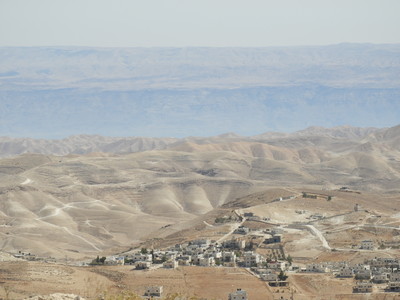
Hilly road to Bethlehem

Nativity star
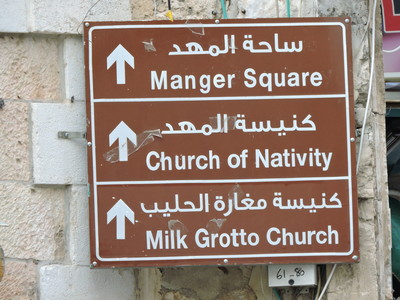
Signposting in Bethlehem
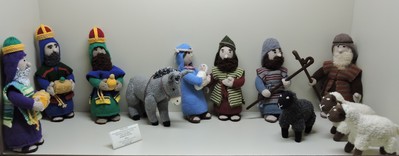
Knitted nativity
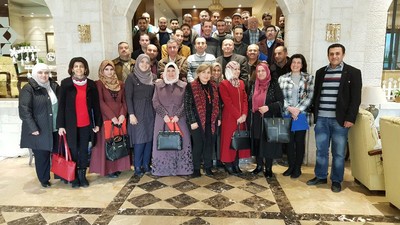
Pain workshop; Dr Amal Awad centre
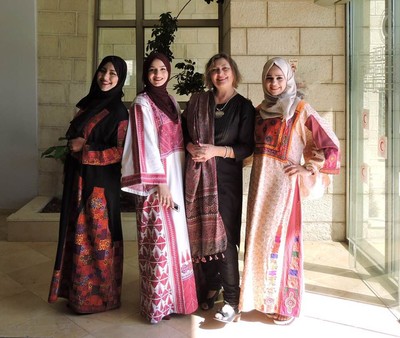
Traditional Palestinian dress; beautifully modeled at the Palestine Cancer Conference
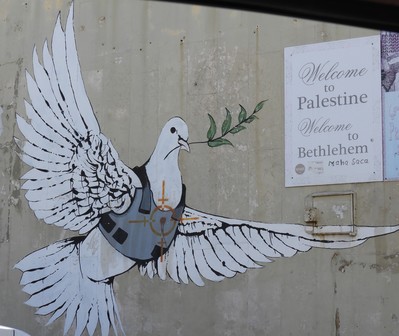
Peace
Practical Ways of Helping The Work of Cairdeas
![]() Cairdeas
Cairdeas
![]() 23rd October 2018
23rd October 2018
Cairdeas has formed a UK Focus Group and wishes to attract new members to come on board. Read on to decide if you might be interested in joining this sub-group or participating in the wider aspects of its work within the UK to bolster and support our core work overseas.
This group has a wide remit and here are some of the ways you can get involved and help Cairdeas whilst based in the UK.
1. RAISE AWARENESS of the remit, work, and impact of Cairdeas. Perhaps you would be available to speak about Cairdeas at church gatherings, coffee mornings, to represent Cairdeas at relevant conferences, etc.;
2. EXPANDand GROW the UK donor base by helping to spread the message of our work in your community, family and friends;
3. COLLABORATE with us: pursue partnership working, if you are part of a like-minded organisation there might be potential for making joint funding applications;
4. ADVOCATE for Cairdeas where there is any potential to represent Cairdeas’ work – for example, advocating for global palliative care, linking with Scottish and UK parliament;
5. ENGAGE in specific areas of work – whether at home or abroad, via the Cairdeas Faculty, explore opportunities for volunteering at Cairdeas;
6. ASSISTANCE in developing educational and curriculum resources, online courses, training, etc.
7. SUPPORTand NURTURE others; offer encouragement and mentoring to volunteers committing to international placements with Cairdeas;
If you could help in any of these ways, please email operations@caidreas.org.uk
We look forward to hearing from you.

Toko Friday – How Cairdeas is helping me follow my true vocation
![]() Cairdeas
Cairdeas
![]() 15th October 2018
15th October 2018
At Cairdeas we are committed to offering support for staff development through scholarships that have a direct impact on patient care. These scholarships make a huge difference to the community and we welcome any donations to allow this work to continue and expand.
Toko Friday is part way through his training via one such scholarship and he describes the difference it is making to his life and the lives of others.
“My name is Toko Friday and, thanks to Cairdeas, I have started a degree in social work and social administration in Kampala. Once qualified, I will continue to apply to my work in the field of palliative care. Already I am learning so much, and enhancing my knowledge and skills to empower me to perform better in my role asa volunteer coordinator. This training, alongside my daily work, is showing much fruit. I am learning how to research and write volunteer policies and procedures, including risk assessments; this includes describing appropriate volunteering opportunities and writing up roles based on the needs of the organisation. I am learning how to manage budgets and helping with some fundraising to sustain our project. In any one day I can be reading up on legislation and policies related to volunteering or writing monitoring and evaluation reports for funders. There is variety in the course, for sure!”
“The training supports my ongoing role in the Sanyu Ministry at Lugogo Baptist Church where I work closely with the staff from Makerere & Mulago Palliative Care Unit and the Elders board. Together, we match the skills of volunteers with the hospital’s needs for assistance. I arrange for volunteer orientation and training and I schedule all volunteer activity. I keep records on how many volunteers we have, when they volunteer and for how long. For me, the main gift in the work I do is the pastoral care and support to I am able to offer patients.”
“A few weeks ago a young woman whose child was very ill and then died, came to thank the church for all the support she was given during this very difficult time. She said, ‘I thank God for this team’. Another patient told us, ‘I want to thank God for bringing you into my life, I feel loved and cared for.’”
“Overall, the most important thing for me is being able to create a difference in the lives of patients and families through listening to their worries and concerns and being able to bring hope and joy by creating a smile on their faces amidst pain and suffering. This work is indeed, a blessing.”
If you are able to help Toko, and others like him, to build their capacity in delivering quality palliative care in Uganda, please consider making a donation to the work of Cairdeas. Click here to find details of how to donate to specific appeals or to set up a one-off or regular donation to the work of Cairdeas.
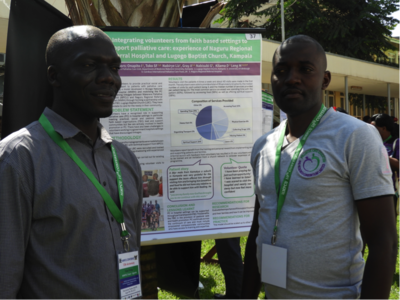
Toko and the Sanyu team share their work at the Cairdeas/MMPCU 10th anniversary conference
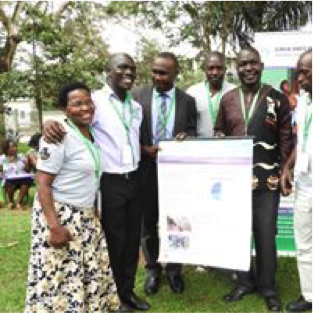
Sanyu team with Pastor Dennis
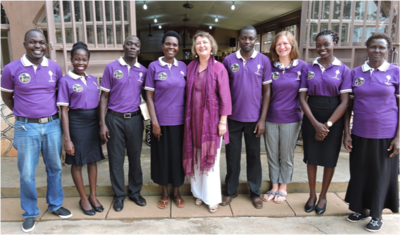
Sanyo Team at Lugogo Baptist Church
